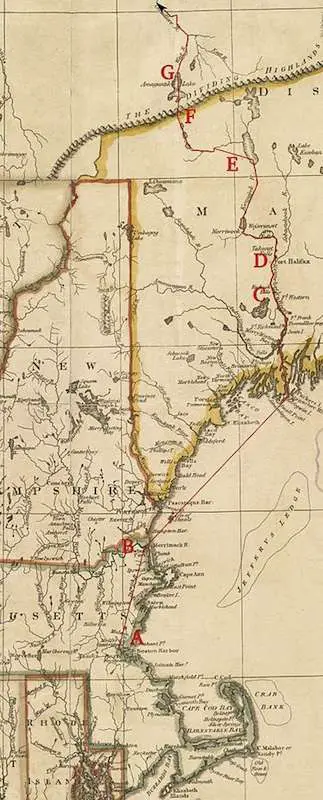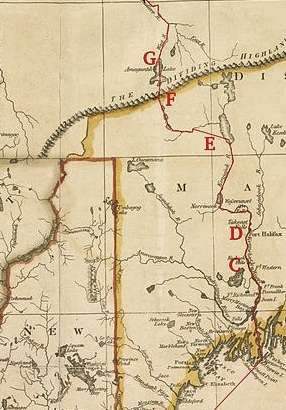Caleb Haskell was one of the men who survived Benedict Arnold’s march to Quebec through the poorly charted Maine wilderness. Arnold’s ambition was to capture the city, but he was lucky to have any men left by the time it was over.
During Arnold’s expedition to Quebec, his men traveled twice as far as the 175 miles they planned. Their boats leaked, their gunpowder was ruined, their food grew scarce. By the time Arnold reached the French settlements above the St. Lawrence River, he had only 600 starving men left from the 750 who started out.

Detail of 1795 map overlaid with Arnold’s expedition route. A Cambridge; B Newburyport; C Fort Western; D Fort Halifax; E Great Carrying Place; F Height of Land; G Lake Megantic. Courtesy Boston Public Library.
Caleb Haskell kept a diary from the time he enlisted in the American Army in Newburyport, Mass. in May 1775. After the Battle of Bunker Hill he marched back to Newburyport with Arnold, boarded one of 11 transport ships and in September set sail for what is now Maine.
By late September, when Arnold’s men reached Fort Western, the weather turned cold and rainy. They set out in shallow-draft river boats called bateaux up the Kennebec River. Three days into the journey, Haskell realized how hard it would be. The river water was swift and the shoal full of rocks, ripples and falls.
On Oct. 20th, they lost three boats going down the rapids. Four days later, a council decided that all who couldn’t carry packs and provisions should be sent back. An advance party was sent forward. Another boat was lost coming over the falls, leaving only three.
On Oct. 27th, three of the companies were discouraged and turned back. Haskell wrote that Arnold ordered the remaining men to “leave all the boats and take what provisions we had on our backs and go on as fast as possible.”
On Oct. 29, they set out through a swamp up to their knees in water.
By the end of October, Haskell wrote ‘a great number’ of men weren’t able to keep up because of hunger and fatigue. They left five behind in the woods to fend for themselves.
“We had rough walking over rough mountains and through almost impregnable swamps, traveled 15 miles and camped,” he wrote. “There is scarcely any one who has any more than one days’ provision, and that small, and a great number none at all. Some have had none at all for two days. Capt. Goodrich’s company have nothing but a large dog, which they killed and ate tonight.”
On Nov. 1, they set out weak and faint with nothing to eat and the ground covered with snow. For supper they ate part of the hind quarter of a dog. “We are in a pitiful condition,” wrote Haskell.
Thing started to get better the next day:
Nove. 2: Set out early this morning, very much discouraged, having nothing to eat and no prospect of anything; we are so faint and weak we can scarcely walk, obliged to lighten our packs, having been upon a very short allowance for sixteen days. We travelled about 11 miles, and to our great joy met a supply of provision sent out to us by Col. Arnold from the inhabitants of Canada. We were glad to see them — our friends — we killed one of the cattle immediately and refreshed ourselves: encamped.
On Nov. 3, they reached a village called Satagan, where their kind treatment gave them new courage. Wrote Caleb Haskell in his diary:
November 3d, Friday. — This morning we took new courage and set out, leaving but fourteen miles to travel to the inhabitants of Canada. A snow storm; the going exceedingly miry. About two o’clock we espied a house–then he gave three huzzas, for we have not seen a house before for thirty days. We came to the inhabitants; the village is called Satagan. The people are all French and Indians, but they are exceedingly kind to us. Here we have provisions provided for us, but could not be entertained in a house, there being but three or four, and those small. The Indians live in wigwams. We refreshed ourselves and built huts and fires, but were uncomfortable, there being a bad snow storm.
And on Nov. 4:
November 4th, Saturday.–We set out early this morning, had bad traveling by reason of the late snow. We travelled ten miles and got refreshment; got liberty of one of the inhabitants to sleep in his house. The people are kind to us.

4 comments
[…] Caleb Haskell, outside of Quebec City, 1777, from his diary. […]
[…] 34 wounded and 431 captured. The British lost only five killed and 14 wounded. Also wounded was Col. Benedict Arnold, the 35-year-old former Connecticut militia officer who led the expedition to […]
[…] when he signed up for Arnold’s expedition. Arnold badly miscalculated the hardship his men would suffer on the march, which was twice as long as he planned. The men endured grueling portages up the Kennebec River. […]
[…] because of rough water. On July 4, the rivermen tried to break up a logjam at the Blue Rock Pitch. A bateau was launched with seven red-shirted men, captained by Joe Attien from the […]
Comments are closed.